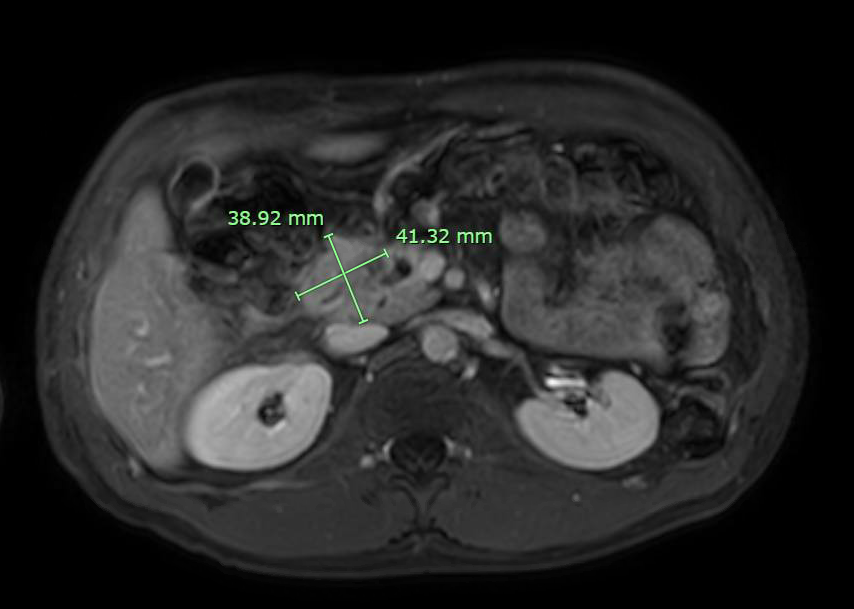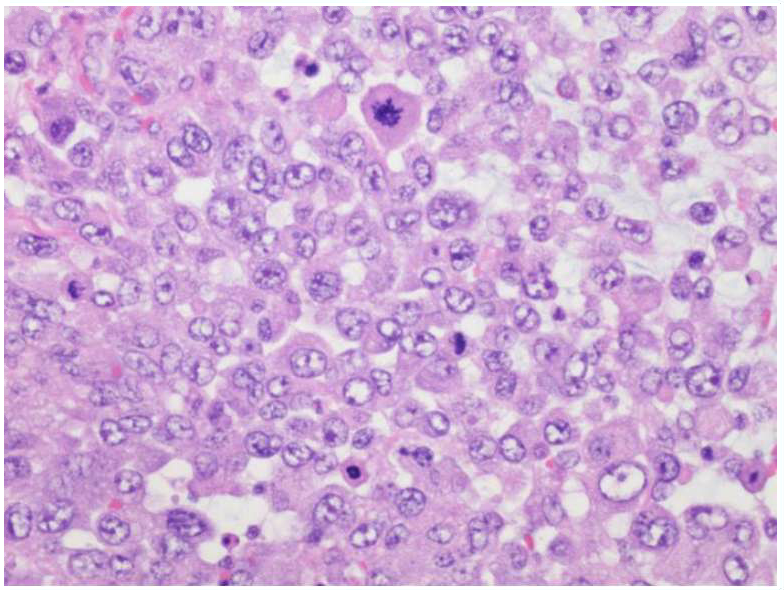Monday Poster Session
Category: Small Intestine
P4093 - The Initial Fall: How an Incidence of Syncope Led to Life With Duodenal Adenocarcinoma
Monday, October 27, 2025
10:30 AM - 4:00 PM PDT
Location: Exhibit Hall
- SC
Sareena Contractor, DO (she/her/hers)
University of Texas at Tyler Health Science Center
Tyler, TX
Presenting Author(s)
Sareena Contractor, DO1, ChiAyrsh Ford, DO, BS1, Abdelrazig Suliman, MD2
1University of Texas at Tyler Health Science Center, Tyler, TX; 2University of Texas, Tyler, TX
Introduction: Duodenal adenocarcinoma is a rare and often aggressive form of cancer. It represents 1% of all gastrointestinal malignancies, with an average incidence of 2.6 per 100,000 men and 2.0 per 100,000 women. Due to its rarity, location, and nonspecific symptoms, diagnosis occurs after the cancer has reached a late stage. We present a case of a 42-year-old male who was diagnosed with metastatic duodenal adenocarcinoma, whose condition worsened before the initiation of palliative chemotherapy.
Case Description/
Methods: A 42-year-old male with a medical history of diabetes requiring insulin and a social history significant to alcohol use, sober for 6 months and dip tobacco use, who initially presented in 01/2025 with a complaint of dizziness and a witnessed syncopal episode. He had an initial EGD that revealed a 4 cm duodenal ulcer, which revealed duodenal adenocarcinoma on biopsy. He then had an EUS, which showed a concern for metastatic duodenal adenocarcinoma with at least 3-4 hypoechoic lymph nodes in the porta hepatis. He underwent a Whipple procedure and was discharged home after being in the hospital for 2 weeks with plans to follow up with oncology outpatient for palliative chemotherapy. He had a port placed in the interim. One month later, he returned to the hospital with a complaint of abdominal pain and melena before initiation of palliative chemotherapy. During his workup for worsening melena, requiring 13 units of PRBCs, and obstructive jaundice requiring IR-guided biliary drain placement, he developed altered mental status and acute hypoxic respiratory failure. In the setting of a poor prognosis, the family chose to pursue comfort care with the assistance of palliative care. He passed away less than 24 hours after the initiation of comfort care measures, notably about 2 months after the initial diagnosis.
Discussion: Duodenal adenocarcinoma is often diagnosed once it has reached a late stage, and the risk of mortality is significant. Our patient initially presented with dizziness and a syncopal episode, and the workup revealed metastatic duodenal adenocarcinoma. His history of diabetes and social history of alcohol and tobacco use likely had a potential impact on the disease progression. While palliative chemotherapy was initially planned, our patient was not able to receive this treatment. This case highlights the importance of early initiation of palliative care in managing duodenal adenocarcinoma.

Figure: Poorly differentiated adenocarcinoma arising from the duodenum and extending into the pancreatic head.

Figure: MRI of the abdomen with and without contrast showed a 3.9 x4.1 x 3.5 cm tumor in the second portion of the duodenum extending into the pancreatic head. The tumor epicenter is located in the duodenum rather than in the pancreas.
Disclosures:
Sareena Contractor indicated no relevant financial relationships.
ChiAyrsh Ford indicated no relevant financial relationships.
Abdelrazig Suliman indicated no relevant financial relationships.
Sareena Contractor, DO1, ChiAyrsh Ford, DO, BS1, Abdelrazig Suliman, MD2. P4093 - The Initial Fall: How an Incidence of Syncope Led to Life With Duodenal Adenocarcinoma, ACG 2025 Annual Scientific Meeting Abstracts. Phoenix, AZ: American College of Gastroenterology.
1University of Texas at Tyler Health Science Center, Tyler, TX; 2University of Texas, Tyler, TX
Introduction: Duodenal adenocarcinoma is a rare and often aggressive form of cancer. It represents 1% of all gastrointestinal malignancies, with an average incidence of 2.6 per 100,000 men and 2.0 per 100,000 women. Due to its rarity, location, and nonspecific symptoms, diagnosis occurs after the cancer has reached a late stage. We present a case of a 42-year-old male who was diagnosed with metastatic duodenal adenocarcinoma, whose condition worsened before the initiation of palliative chemotherapy.
Case Description/
Methods: A 42-year-old male with a medical history of diabetes requiring insulin and a social history significant to alcohol use, sober for 6 months and dip tobacco use, who initially presented in 01/2025 with a complaint of dizziness and a witnessed syncopal episode. He had an initial EGD that revealed a 4 cm duodenal ulcer, which revealed duodenal adenocarcinoma on biopsy. He then had an EUS, which showed a concern for metastatic duodenal adenocarcinoma with at least 3-4 hypoechoic lymph nodes in the porta hepatis. He underwent a Whipple procedure and was discharged home after being in the hospital for 2 weeks with plans to follow up with oncology outpatient for palliative chemotherapy. He had a port placed in the interim. One month later, he returned to the hospital with a complaint of abdominal pain and melena before initiation of palliative chemotherapy. During his workup for worsening melena, requiring 13 units of PRBCs, and obstructive jaundice requiring IR-guided biliary drain placement, he developed altered mental status and acute hypoxic respiratory failure. In the setting of a poor prognosis, the family chose to pursue comfort care with the assistance of palliative care. He passed away less than 24 hours after the initiation of comfort care measures, notably about 2 months after the initial diagnosis.
Discussion: Duodenal adenocarcinoma is often diagnosed once it has reached a late stage, and the risk of mortality is significant. Our patient initially presented with dizziness and a syncopal episode, and the workup revealed metastatic duodenal adenocarcinoma. His history of diabetes and social history of alcohol and tobacco use likely had a potential impact on the disease progression. While palliative chemotherapy was initially planned, our patient was not able to receive this treatment. This case highlights the importance of early initiation of palliative care in managing duodenal adenocarcinoma.

Figure: Poorly differentiated adenocarcinoma arising from the duodenum and extending into the pancreatic head.

Figure: MRI of the abdomen with and without contrast showed a 3.9 x4.1 x 3.5 cm tumor in the second portion of the duodenum extending into the pancreatic head. The tumor epicenter is located in the duodenum rather than in the pancreas.
Disclosures:
Sareena Contractor indicated no relevant financial relationships.
ChiAyrsh Ford indicated no relevant financial relationships.
Abdelrazig Suliman indicated no relevant financial relationships.
Sareena Contractor, DO1, ChiAyrsh Ford, DO, BS1, Abdelrazig Suliman, MD2. P4093 - The Initial Fall: How an Incidence of Syncope Led to Life With Duodenal Adenocarcinoma, ACG 2025 Annual Scientific Meeting Abstracts. Phoenix, AZ: American College of Gastroenterology.
